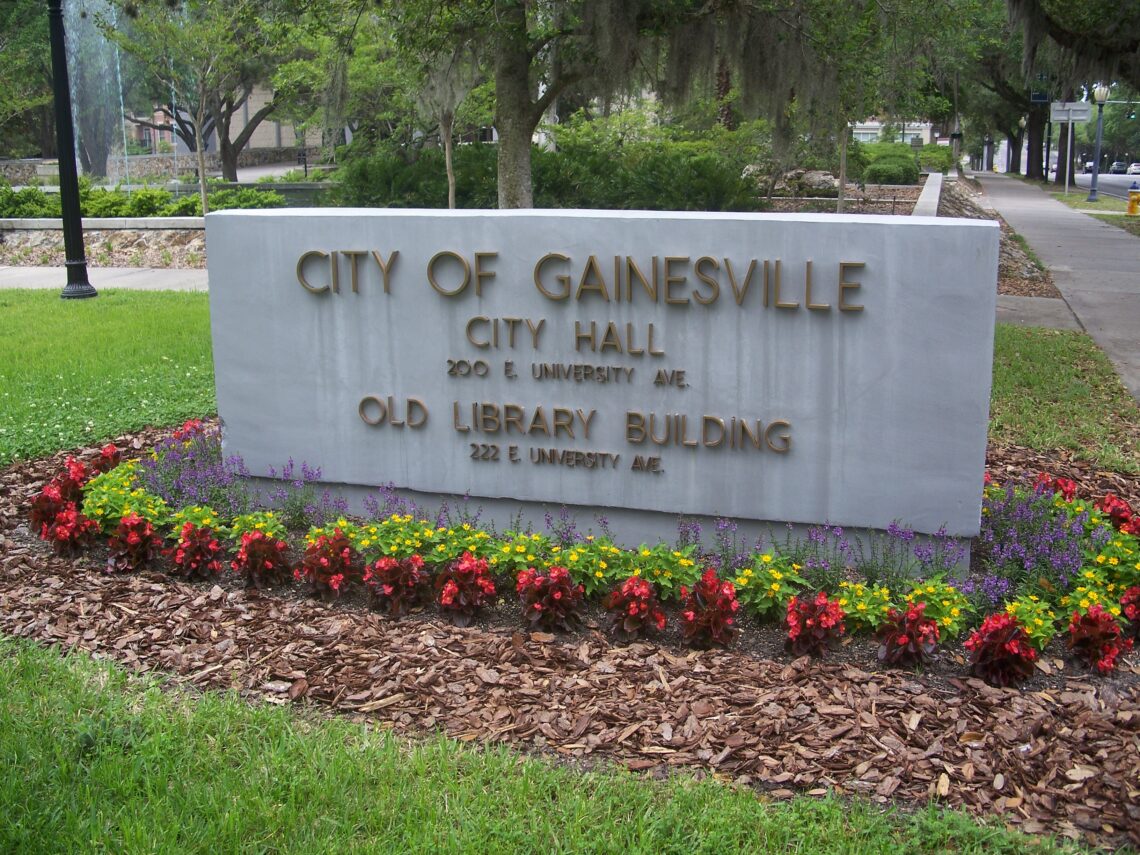The City of Gainesville is entertaining the idea of transformative governance reform — shifting its current seven-member commission from a weak mayor form of government to a strong mayor system.
This effort marks the most recent push in Florida for further mayoral empowerment following defeated moves in 2018 in Miami and Clearwater. Both cities presented ballot initiatives that sought to replace the city manager position by transferring duties to the mayor, receiving the support of a third of voters.
Mayoral Systems, Explained
A weak mayor system, or a council-manager system, is a city commission where the chief executive powers reside in the city manager. The city manager is commonly appointed to the position by the city commission and is responsible for the administrative operations. A city manager’s duties could range from meeting with citizens to drafting the city’s yearly budget.
A key feature of the weak mayor system is that the role of the mayor is largely ceremonial with no executive authority beyond acting as the presiding officer of the city commission. The mayor can either serve as a commissioner and be appointed to the mayoral office from within the commission or can be directly elected by the constituents of the municipality.
In a strong mayor system, the mayor serves as the municipality’s chief executive with the extent of executive power varying on a city-by-city basis. With this executive power comes the principal responsibility to make hiring and firing decisions of the city’s charter officers as opposed to Gainesville, where managerial power rests with the city commission.
Charter officers are city departmental positions that are legally defined through the city’s charter, a municipal version of a constitution. Specifically within Gainesville, the charter officers include the city manager, the city attorney, the city clerk, the city internal auditor, the utilities’ general manager, and an equal opportunity director.
The New Proposal for Governance Reform
Currently under debate, the city commission’s proposed charter amendment for a strong mayor system would alter the City of Gainesville’s form of governance in addition to the responsibility of personnel management. Spearheaded by Commissioner David Arreola, the proposed shift would be a hybrid strong form of government.
Under Arreola’s proposal, the primary authority to hire and fire charter officers would fall under the mayor’s discretion while simultaneously providing veto power to the city commission.
“I think that for a lot of people, they see this as an elevation of the mayor’s office… the mayor would still need the city commission’s votes to get any of their legislative agenda through, so it encourages collaboration on the city commission, and I think it’s a trade-off for the added authority that we are giving to the mayor,” Arreola said.
As a way to avoid a stagnant commission, Arreola views the proposal as a way to push for a more proactive government in Gainesville.
“I think that the current system encourages silence on personnel issues,” Arreola said.
Another important facet of the proposal is the mayor’s ascension from the city commission. The goal of removing the mayor from the city commission is to incentivize the mayor to form strong connections with the commissioners due to no longer having a direct vote, Arreola said. While the mayor would be given additional authority, Arreola has proposed adding another commissioner to offset the seat that would be vacated by the mayor under this proposal.
Caption: Slide from Magruder’s American Government: Presentation Pro, Chapter 25 Prentice Hall 2001
The duties and responsibilities of charter officers will not be altered or shifted elsewhere under the new proposal, according to Arreola.
Caption: City of Gainesville Commission Districts
The Current Situation in Gainesville
According to the U.S. Census Bureau, the City of Gainesville’s population has risen from 124,504 in 2010 to 133,997 in 2019, indicating a population growth of 7.6%.
This modest increase in the city’s population could have an oversized impact on the next mayoral race, amplifying the relevance of Arreola’s proposal.
“For the first time ever, this city is going to be electing a city commission in the fall, and that is going to mean higher voter turnout and more participation,” Arreola said. “If the city commission decides to pursue these changes, it would have to be put on the ballot to be approved by a majority of voters, and that’s what I want.”
Another factor looming over the next election is the ineligibility of current Gainesville Mayor Lauren Poe to run for election again. After running for election originally in 2016 and then again for reelection in 2019, Poe is no longer eligible to run again for the position per Gainesville’s code of ordinances.
Unlike in Gainesville’s system before 1998 when the mayor was elected from within the commission, a direct popular vote for mayor requires the support of the majority of the city, allowing candidates to campaign on platforms. Under a strong mayor system, elections can lead to the mayor selecting charter officers with the same principles as their public platform.
Citing the 2020 Black Lives Matter protests, Poe said that mayors and city governments needed to adapt to the country’s racial justice reckoning. Strong mayor governments are more flexible in developing policy and responding to the community’s needs, Poe said.
“We’re a complicated city, we offer a tremendous amount of services and do it at a very high level… I think we need more direct accountability to the one person to oversee that,” Poe added in support of Arreola’s plan.
Dispelling claims that this may centralize power too much with the mayor, Poe said that opponents of the current proposal must remember the mayor would be losing the seat on the commission.
“I would feel like I had less power with more responsibility,” Poe said.
Making clear that he has not made up his mind yet, Poe said that he is remaining open-minded until he sees the final verbiage from Arreola.
Arreola remains optimistic about the proposal’s future in Gainesville’s government as he continues to adjust the amendment. The last time Gainesville voted for a ballot initiative on mayoral governance reform, it passed with popular support and adopted the current system. Arreola believes his proposed charter amendment will experience the same support.
However, political drama has taken center stage in Gainesville. Gainesville faced a series of resignations from five city employees over the past four months, including a city commissioner and the city manager. On Aug. 23, Gail Johnson resigned from her seat on the city commission, forcing the city to call a special election to fill the at-large seat for Nov. 16.
The personnel changes in Gainesville’s government recently pushed Arreola to table his own proposal during last week’s city commission meeting. Arreola explained that he believes the conversation is better held at a later date in order to allow for a special session of the Charter Review Commission.
The Charter Review Commission did consider a similar proposal for a strong mayor system earlier in its session, although there was not enough support for it to appear as an amendment on the November 2020 ballot. Mary Lou Hildreth, the chair of that commission and current Hampton city clerk, told the Florida Political Review that while she does not personally support the proposal, she has heard from members who want to call a special session.
Regardless of the timing of its next appearance, Arreola believes his proposal is a discussion worth having for voters.
“This is something that gives democracy [and] gives the choice to the people,” Arreola said.
Check out other recent articles from Florida Political Review here.
Featured Image: Gainesville City Hall sign. Unmodified image from WikiMedia Commons used under a Creative Commons License. (https://bit.ly/3Fy50oL)





